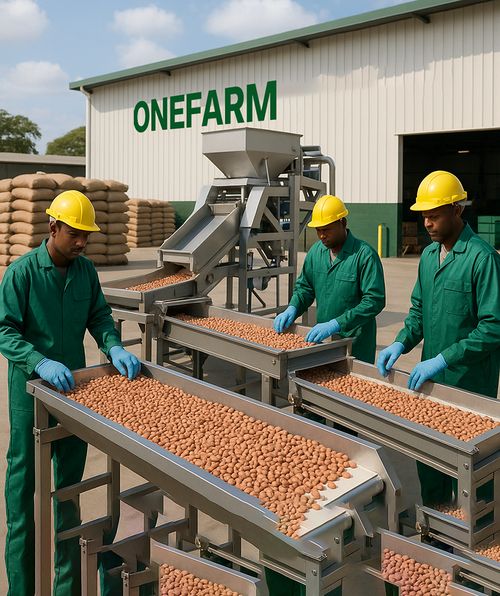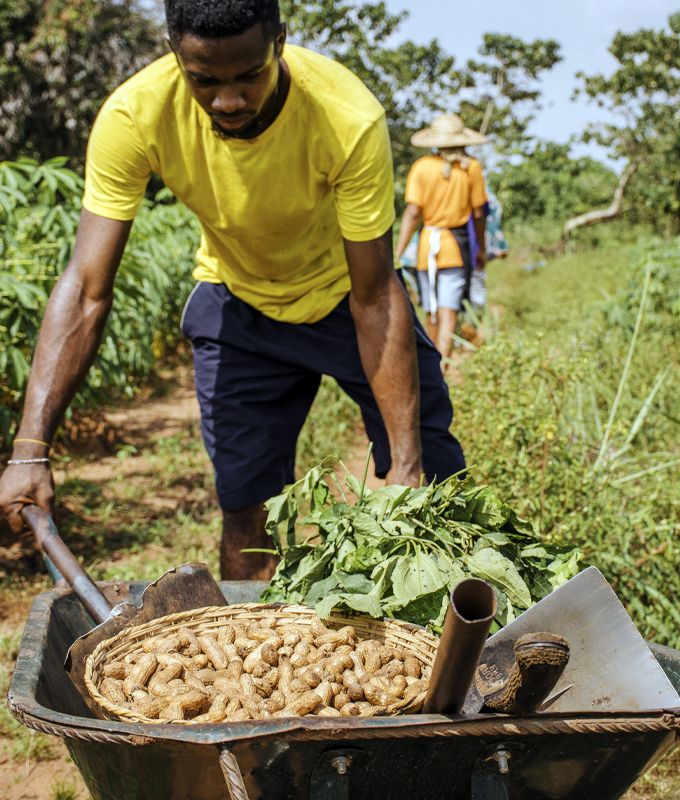

About Us
Onefarm is redefining agriculture in Nigeria through sustainability and innovation. We leverage local agricultural resources (the community, the people, organic matters, etc.) to produce premium products for both local and global markets. Our eco-friendly farming practices embody the principles of regenerative organic agriculture, ensuring environmental preservation while delivering exceptional quality.
Our Mission
Our mission is rooted in sustainability, innovation, and community support. By embracing sustainable practices, including our commitment to regenerative organic farming, we set new quality standards in agriculture. We are transforming local farming communities and educational institutions into thriving and productive societies. We are enhancing food security, creating jobs, and uplifting the livelihoods of farmers across the nation.
We’re not just growing groundnuts; we are nurturing a sustainable agricultural legacy for Africa, one rooted in care, creativity, and commitment to the future leveraging technology.
Our mission is to regenerate soil fertility in order to grow food that is healthy through the sustainable management of crops

Our Core Values
Sustainability:
Quality:
Innovation:
Integrity:
Community Support:
Regenerative Organic Agriculture is our commitment.
We believe that the best solution is always under our feet, in the soil; that’s why Onefarm continues to innovate and provide new sustainable solutions for the most demanding soil and remains committed to the principles of agroecology.
If we manage to develop a living soil, we will gain in the fertility and regeneration of arable land and the microbial communities that live in it. These practices ensure our land remains fertile and productive for generations to come. In addition, by carrying out the necessary interventions with the appropriate solution, we will increase the level of organic carbon in the soil so that it retains more water and is more fertile.

Our sustainable initiatives include:
- Soil Enrichment: Utilizing natural compost to boost soil fertility.
- Water Conservation: Employing efficient irrigation systems to maximize water use.
- Carbon Sequestration: Reducing our carbon footprint through eco-conscious farming methods.
What is our Goal?
By 2030, in collaboration with other stakeholders, we will positively impact the lives of 10 million farmers with 10,000,000 hectares of regenerative organic producing farms, impact soil health and the financial security of the farming communities in the Onefarm ecosystem. The key metrics include:
- Community: 10,000,000 farmers and Agriticians
- Acreage: 10 million hectares
Practical Applications
“Sustainable groundnut farming practices, such as organic amendments and crop rotation, overlap with regenerative agriculture, potentially increasing yields and soil resilience.”
Organic Soil Amendments
We apply well-decomposed cow dung, poultry manure, or composted crop residues before planting which improves soil structure, increases microbial activity, supplies slow-release nutrients. We mix biochar (charred crop waste or cow dung) into the topsoil to increases water retention, buffers pH, and stores carbon in the soil.
Crop Rotation
Rotate groundnuts with maize, sorghum, millet, cowpea or soybean. These cereal and legumes break the pest cycle (especially for nematodes and fungi affecting groundnuts) and fix atmospheric nitrogen, enhancing soil fertility.
Conservation Tillage
Maintains soil structure and microbial habitats, reduces erosion and retains carbon in the soil.
Plant Soil-Cover Crops
We plant cover-crops during the dry/off-season or between main crops to protect soil from erosion and suppress weeds We achieve this by planting grass and pest-repelling plants like marigold which reduces chemical pesticide dependence and protects pollinators


